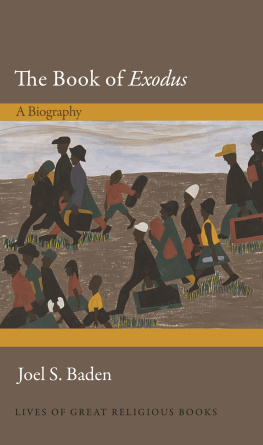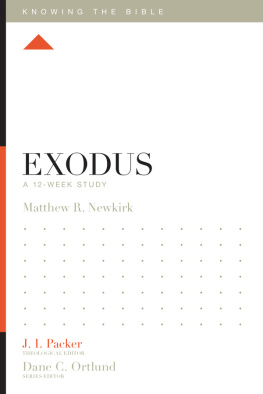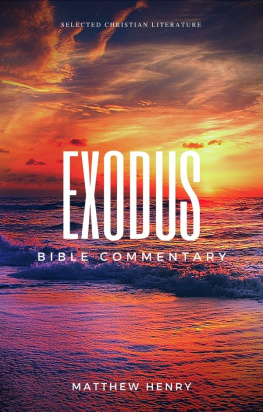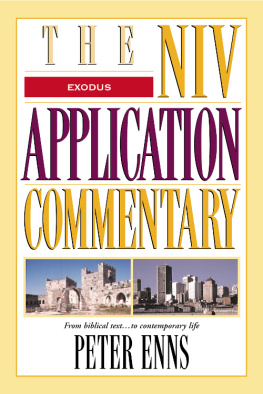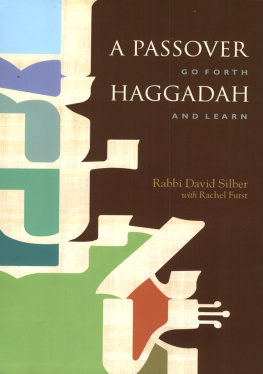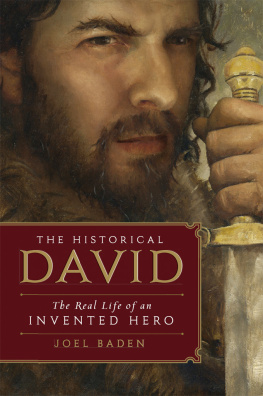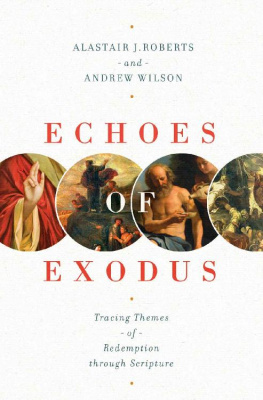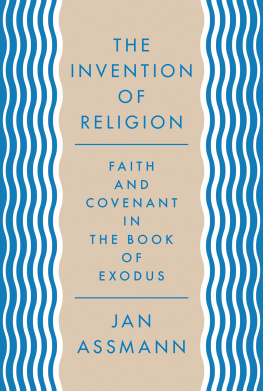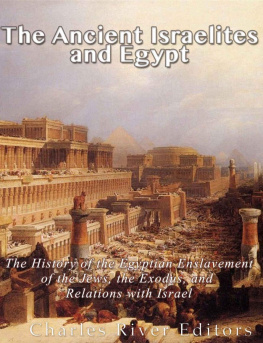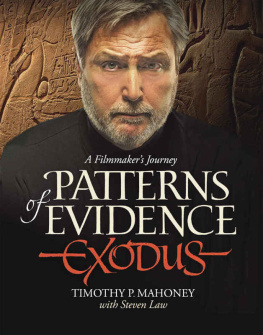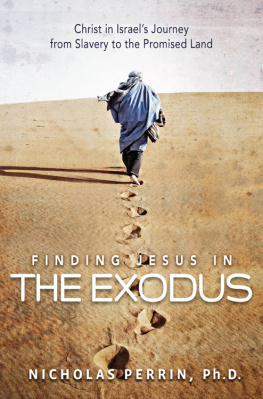
LIVES OF GREAT RELIGIOUS BOOKS
The Book of Exodus
LIVES OF GREAT RELIGIOUS BOOKS
The Book of Exodus, Joel S. Baden
The Book of Revelation, Timothy Beal
The Dead Sea Scrolls, John J. Collins
The Bhagavad Gita, Richard H. Davis
John Calvins Institutes of the Christian Religion, Bruce Gordon
The Book of Mormon, Paul C. Gutjahr
The Book of Genesis, Ronald Hendel
The Book of Common Prayer, Alan Jacobs
The Book of Job, Mark Larrimore
The Koran in English, Bruce B. Lawrence
The Lotus Stra, Donald S. Lopez, Jr.
The Tibetan Book of the Dead, Donald S. Lopez, Jr.
C. S. Lewiss Mere Christianity, George M. Marsden
Dietrich Bonhoeffers Letters and Papers from Prison, Martin E. Marty
Thomas Aquinass Summa theologiae, Bernard McGinn
The I Ching, Richard J. Smith
The Yoga Sutra of Patanjali, David Gordon White
Augustines Confessions, Garry Wills
The Talmud, Barry Scott Wimpfheimer
FORTHCOMING
The Analects of Confucius, Annping Chin and Jonathan D. Spence
The Life of Saint Teresa of Avila, Carlos Eire
Josephuss The Jewish War, Martin Goodman
Dantes Divine Comedy, Joseph Luzzi
The Greatest Translations of All Time, Jack Miles
The Letters of Paul, Margaret M. Mitchell
The Passover Haggadah, Vanessa Ochs
The Song of Songs, Ilana Pardes
The Daode Jing, James Robson
Rumis Masnavi, Omid Safi
The Book of Exodus
A BIOGRAPHY
Joel S. Baden
PRINCETON UNIVERSITY PRESS
Princeton and Oxford
Copyright 2019 by Princeton University Press
Published by Princeton University Press
41 William Street, Princeton, New Jersey 08540
6 Oxford Street, Woodstock, Oxfordshire OX20 1TR
press.princeton.edu
All Rights Reserved
Library of Congress Control Number: 2018957588
ISBN 978-0-691-16954-5
British Library Cataloging-in-Publication Data is available
Editorial: Fred Appel, Thalia Leaf
Production Editorial: Terri OPrey
Text Design: Lorraine Doneker
Jacket/Cover Design: Lorraine Doneker
Jacket Art: Jacob Lawrence, The Migrants Arrived in Great Numbers,
1940. 2018 The Jacob and Gwendolyn Knight Lawrence Foundation,
Seattle /Artists Rights Society (ARS)
Production: Erin Suydam
Publicity: Tayler Lord, Kathyrn Stevens
Copyeditor: Cathryn Slovensky
This book has been composed in Garamond Premier Pro
Printed on acid-free paper.
Printed in the United States of America
10 9 8 7 6 5 4 3 2 1
For my grandmother, Beatrice Gitlin,
who celebrates her ninety-eighth Passover this year
CONTENTS
ACKNOWLEDGMENTS
A book such as this, which ranges far from my native scholarly field, is necessarily made possible only with the support of friends and colleagues. I am grateful to all those who took the time to read portions of the manuscript, saving me from any number of errors and oversights. These include Harry Attridge, Andrew McGowan, Marc Brettler, Bruce Gordon, and Benjamin Valentin.
I am also deeply indebted to my graduate student assistants, without whom the project could not have been either started or completed: Laura Carlson, Harley Roberts, and James Nati.
Candida Moss is, as always, my constant intellectual companion, for which I am always thankful.
My daughters, Zara and Iris, are the ever-brilliant lights of my life, for whom I do all things.
This book is dedicated to my grandmother, who still sings the Four Questions in Yiddish at every Passoverproof of the enduring and ever-adaptive nature of the Exodus, and, at ninety-eight, of her own endurance as well.
INTRODUCTION
The book of Exodus is the second book of the Hebrew Bible, but it may rank first in lasting cultural importance. It is in Exodus that the classic biblical themes of oppression and redemption, of human enslavement and divine salvation, are most dramatically and famously expressed. Many of the Bibles most famous characters and episodes are found here: Moses, Aaron, and Miriam, the burning bush, the ten plagues, the Passover, the crossing of the sea, the revelation and law-giving on Mount Sinai, the Ten Commandments, the golden calf. The story of suffering, escape, and journey through the wilderness toward the promised land was the defining narrative for ancient Israel and has maintained a central position in Western culture ever since. This book will trace that story through some of its most prominent and fascinating permutations, showing how Exodus has been adopted and adapted in numerous and often unexpected ways across space and time.
Before we begin, one important clarification is necessary. A distinction must be made between the biblical book of Exodusthe text that comes between Genesis and Leviticus and constitutes one-fifth of the canonical Pentateuch or Torahand the Exodus story. The biblical book is but one, relatively late, stage in the development of the Exodus story. As the first chapter below will argue, what we call the book of Exodus is a somewhat artificial delineation of material within the Pentateuch, one that comprises much, but not all, of the material that we commonly associate with the overarching narrative of the Exodus. Moreover, the biblical book, while containing the central core of the Exodus story, is among the most variegated in the Bible. It also includes poems, law codes, architectural plans, and rituals. Each of these has had its own interpretive trajectoryespecially the extensive description of the tabernacle, which occupies nearly a quarter of the biblical text of Exodus and provides the foundation for, among other things, the traditional Jewish definition of what constitutes forbidden work on the Sabbath. Similarly, many of the individual episodes and characters within the story could be the subjects of their own biographies. This book cannot contain such multitudes. And, as interesting as they are, these various elements are all overshadowed in the history of interpretation by the grand narrative in which they are set.
That grand narrativethe movement from Egypt to Canaan, from oppression to freedomextends beyond the borders of the biblical book to which it lent its name. Its themes appear outside of the book of Exodus, indeed outside of the Pentateuch altogether, and often in forms that predate the composition of the pentateuchal text. Just as the traditional nativity story performed and displayed every Christmas season is not derived from a single New Testament gospel but is a distillation, combination, and expansion of an underlying narrative, so too references to the Exodus story do not tend to reflect the exact contours of the biblical book of Exodus. For millennia, the Exodus has been understood as an event, a tradition, a cultural memory, and a metaphor. The biblical book is itself but one literary version of the Exodus. Though it may be authoritative for some, it is neither the first nor the last word.
It is not the book of Exodus but the Exodus story that has captured the imagination of audiences and interpreters from the biblical period to the present. It is the Exodus story that this volume will be primarily concerned withthough never forgetting that it is the manifestation of the story in the biblical book that is most famous and most influential. In the following pages, we will consider the ways in which individuals and groups, in the thousands of years since the story coalesced into the form we now know, have appropriated this story to be their story, have cast themselves or others into the biblical roles, and have used the themes of this story for their various ends.
Next page
